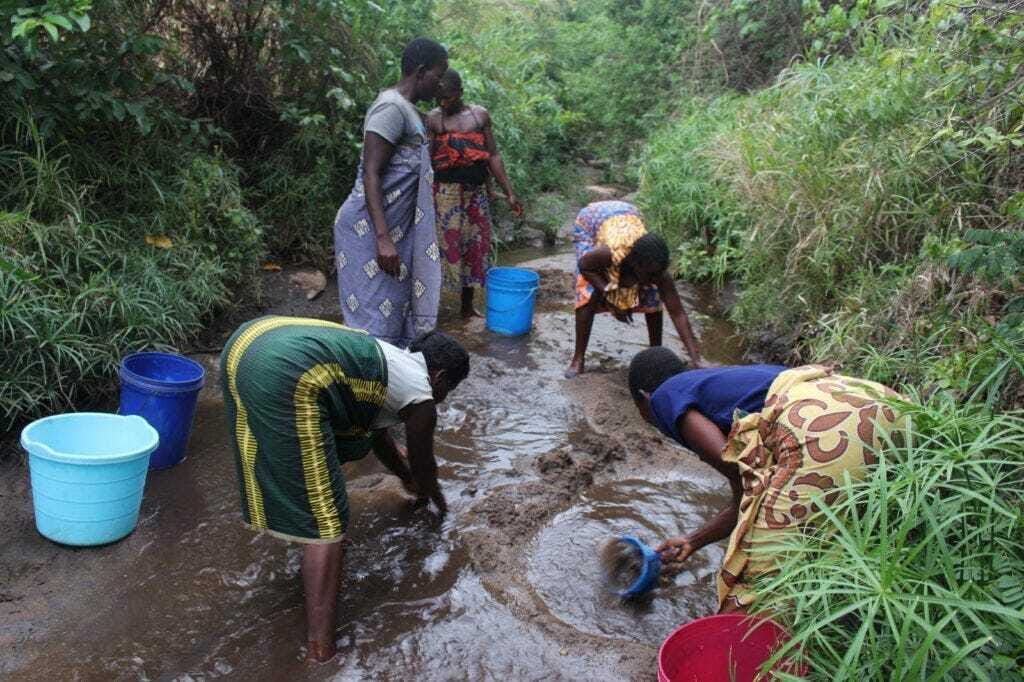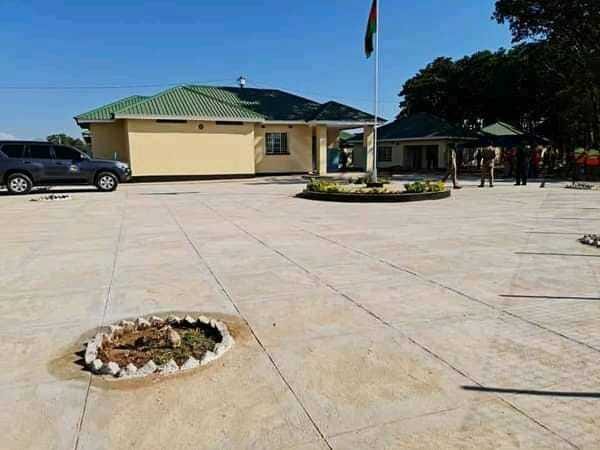
By Jenipher Changwanda
The gesture by the Chinese government to build a modern Police Unit at Nsipe Trading Centre in Ntcheu District could have been received with open hands and jubilation by over 80,000 people of the area.
But for a community that has so many socio-economic challenges, such a donation, while lauded by some, for others it should have come in form of a different development project, other than to address security concerns.
In May 2021, Malawi’s Veep Saulos Chilima presided over the official opening of the Nsipe Police Unit, which is serving communities in the areas of Traditional Authority Champiti, Traditional Authority Kwataine, and Traditional Authority Makwangwala.
The Police Unit comprises offices, two holding cells, a victim support unit, and staff houses. Chilima said the “timely donation came after his interaction with the Chinese Ambassador to Malawi. I therefore, express my appreciation to the President,” Chilima is quoted in an article.

Chinese Ambassador to Malawi Liu Hongyang reiterated his government’s commitment to development projects to Malawi hence the gesture to construct and hand over the Police Unit.
“Police service is one of the most important government agencies that are crucial for national development,” he said.
Decentralization, the people and development
Malawi adopted decentralization in October 1998 as a vehicle for poverty reduction in terms of delivering better services to the Malawian population but also as a means for strengthening democratic institutions and participation at the local level.
It means locals have the power to choose the development they want in a particular community. On the ground, while decentralization is working challenges abound.
Political interference in certain projects tends to defeat the purpose of decentralisation.
Decentralization is based on the principles of participatory democracy, meaning the people should participate in all the processes that affect them – perhaps including projects that a top government official, a Member of Parliament (MP), a Ward Councilor or any individual of goodwill would want to bring into their community.
The case in point – the Nsipe Police Unit – initiated by Chilima– is one example of how duty bearers must consult and involve grassroots on what should be prioritized in a particular community.
Investigations reveal that people in the area are divided on whether or not the Police Unit should have been the Veep’s number one choice of projects to ask from development partners such as the People’s Republic of China.

While decision-makers such as the legislator of the area Dr. Albert Mbawala, traditional leaders and government officials hailed the construction of the police unit, as an important step toward the development of the area, the question is how far did they go in involving the communities around the facility on whether this is kind of development they should have come to them first.
Investigations reveal that people from the three traditional leaders – Champiti, Kwataine, and Makwangwala – spread in Ntcheu Central Constituency – would have loved to have easy access to portable and reliable water, access to public health facilities without having to travel long distances.
Their children go to school without having to cross treacherous rivers, and also see all children starting school at the age 6 instead of 8 as it is now in some areas to mitigate the long distance they endure when going to school among others.
Ezra Mike, Councillor for Riviridzi Ward in Ntcheu Central Constituency acknowledged that problems exist when it comes to choosing development projects for a particular area.
He told the Centre for Investigative Journalism Malawi (CIJM) that as a Councilor he was not consulted on the Nsipe Police Unit project.
“We just heard that contractors were on the ground constructing the facility. They only invited us during the handover ceremony. We are facing a lot of challenges in the decentralization process because decentralization is only on paper; what is happening on the ground does not match with what decentralization mandates,” Mike said.
He said as such most of the time some development projects remain unfinished for a long period.
“But if they had asked us [the Chinese Embassy] about what to prioritize, we could have chosen necessities such as water, health, and education because people in the area are walking long distances to access these facilities.
“On top of that, other communities are drinking water from rivers and unprotected sources because Mpira Dam is failing to accommodate a lot of people. So, we could have prioritized these necessities,” Mike said.
He is not alone.
Vice-chairperson of Makwangwala Area Development Committee, Steven Nkhwangwanya said while decentralization is a model that the government adopted to empower people at the grassroots level to contribute decisions and implement development activities in their communities, the reality is that sometimes locals are taken for granted.
Nkhwangwanya said that locals face challenges when monitoring and evaluating development projects in their respective communities.
“Sometimes when those implementing the development activity know that they have stolen or misappropriated, they hide information about how they have used funds,” he claimed.
Felicia Chapotera, Makwangwala ADC chair said what is more painful is the fact that no one from duty bearers has come forward to explain why the Hospital project is in its current sorry state.
“If decentralization works then it should have worked for us here. We wanted a Health facility at Bawi. They seemed to have heard our call for the project.
” A structure was constructed but that was the beginning and end of our sad story. It would appear we have become a forgotten society and no one cares about us. What else can we say?” she said.
Chapotera said for decentralization to start bearing desired fruits, Members of Parliament, Councilors, and the people must work in collaboration and embrace transparency and accountability.
This is collaborated by Chikondi Chimpango, a member of the ADC who said there are fewer health centers in the constituency.
In upper Makwangwala people walk long distances to access the health facilities.
Chimpango said: “We have unfinished health center at Bawi that could have helped surrounding communities but up to now nothing tangible has happened.
As such, almost nine villagers scramble for medical attention at Nsiyaludzu dispensary. Reports show that Nsiyaludzu alone caters for 36,000 people.”
Champiti ADC chairperson, Frank Mmodziatani said decentralization should take root by giving communities the powers they deserve according to laws.
“We are tools for development. We are supposed to ask questions, when what we asked for is not coming forth. Whoever wants to bring development projects should come through us as ADC. No one should come to communities without us,” he said.
Mmodziatani said he is put off by the tendency of some officials of by-passing communities and the ADC when buying materials for development projects in the area.

“ For instance, they just tell us that this bridge is worth so much without even showing us receipts. In the past, we were involved in the procurement of materials.”
On donations such as the Police Unit at Nsipe, Mmodziatani said the community could not reject a ‘gift’.
He added that the community is benefiting from the donation “as people no longer go to Ntcheu to report cases.
Experts say local voices a key in Decentralization
Decentralization experts and scholars argue that local voices are crucial in decentralization because they know what matters most in their communities.
Decentralization scholar at Chancellor College, Dr. Michael Chasukwa said that ignoring local voices in developmental planning is a recipe for failure because structures like ADCs and VDCs hold inside information that can improve the welfare of their communities and also garner support.
“When you impose development projects on communities, you risk not addressing the real issues because of lack of inside information. The development projects may not be people-centered hence having little impact on the welfare of local communities.
“ It is frustrating on the part of communities that are aware of their problems and have tangible solutions to see that their real concerns are not given adequate attention,” Chasukwa said.
Chasukwa said that in the development aid sector, the top-down approach to project conceptualization and implementation is common even if the development partners preach a participatory way of managing projects.
However, he was quick to say that sometimes soliciting views from the grassroots level remains a challenge due to conditions from the donors.
“Participation is rhetoric in development cooperation because you have development partners that determine which projects to fund and not to fund based on their country strategy which may not align to the national and district priorities and policies.
Time constraints also frustrate the participation of the local communities in development projects. There is also a deadline that project partners are chasing, as such consultations are deemed a waste of time,” Chasukwa explained.
Catholic Commission for Peace and Justice (CCJP) said it is sad that local structures mandated by the Local Government Act were sidelined in a major development activity though they are the voice of rural mass.
“The Act mandates ADCs to initiate developmental activities for communities and they are the ones who know pressing issues in their area so sidelined them does not only retards development only but also perpetuates corruption because nobody watches what the implementers and councils are doing with the public funds on the ground”, said Lawrence Puliti, Dedza Diocesan Secretary for CCJP.

Puliti said that Decentralization is still a mockery in Malawi because what is on the ground does not match with what the policy mandates.
“ Political interference is still a challenge because sometimes politicians form parallel structures to continue campaigning using public developments. ADCs are also threatened when they inquire about developments whose implementation violates guidelines,” Puliti said.
Commenting on Nsipe Police Unit, Peace and Security Expert at Mzuzu University, Eugenio Njoloma said that imposing development on the people will hamper the efforts of the Police of creating a sustainable relationship with the community.
“ The Police Service focuses on creating a strong bond with communities and it also depends on the community on security matters. But when such a scenario happens the Police do not receive much support from the communities,” Njoloma said.
The article was first published by the Centre for Investigative Journalism Malawi (CIJM) – www.investigative-malawi.org – and the Africa China Reporting Project – https://wits.journalism.co.za/africa-china-reporting/, supported this article.